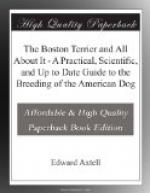In regard to mating, one service, if properly performed, is usually enough, if the bitch is ready to take the dog. If a bitch should fail to be in whelp I should advise the next time she comes in season two or even three visits to the dog, and where convenient I should suggest a different dog this time. In case this time these services were unsuccessful, then I should suggest the course that breeders of thoroughbred horses pursue, viz., to let the female run with the male for three or four days together. There are many things connected with breeding that we do not understand, and frequently going back to nature, as in this case, is productive of results when all else fails.
One very important factor in the production of strong, rugged pups that live, is good feeding. Do not imagine that feeding dog biscuits to the bitch in whelp will give good results, it will not; she needs meat and vegetables once a day. Biscuits are all right as a supplementary food, but that is all. Meat is the natural food for a dog, and it is a wise kennel man that can improve on nature. Be sure the meat is free from taint, especially at this time and when the bitch is nursing pups. The gastric juice of a dog’s stomach is a great germicide, but there is a limit.
Be certain the dogs have a plentiful supply of good, pure water. This is of far more importance than many people imagine.
Do not administer drugs of any description to your dogs, except in the case of a good vermifuge, if they are harboring worms, and a proper dose of castor oil if constipated. If the dog at any time is sick, consult a good veterinary accustomed to dogs, not one who has practiced entirely on horses or cows. If a bitch, at the time of whelping, is much distressed and can not proceed, get a veterinary and get him quick. When the pups arrive, if all is well and they are able to nurse, let them severely alone. If they are very weak they will have to be assisted to suckle—do not delay attention in this case. Be sure the box the bitch whelped in is large enough for her to turn around in, and do not use any material in the nest that the pups can get entangled with. My advice to breeders is, if the bitch is fully formed and grown to her full proportions, to breed the first time she comes in season. She will have an easier time whelping than when she is older. If delicate or immature, delay breeding till the next time. Do not use a dog in the stud until he is a year and a half old for best results; they will, of course, sire pups at a year or younger, but better wait. To those people who live in the city, or where a kennel can not be established for want of adequate room to give the dogs the necessary exercise, an excellent plan to follow is one adopted by an acquaintance of mine, and followed by him for a number of years with a good measure of success. He owns one or two good stud dogs that he keeps at his home, and he has put out on different farms, within a radius of ten




